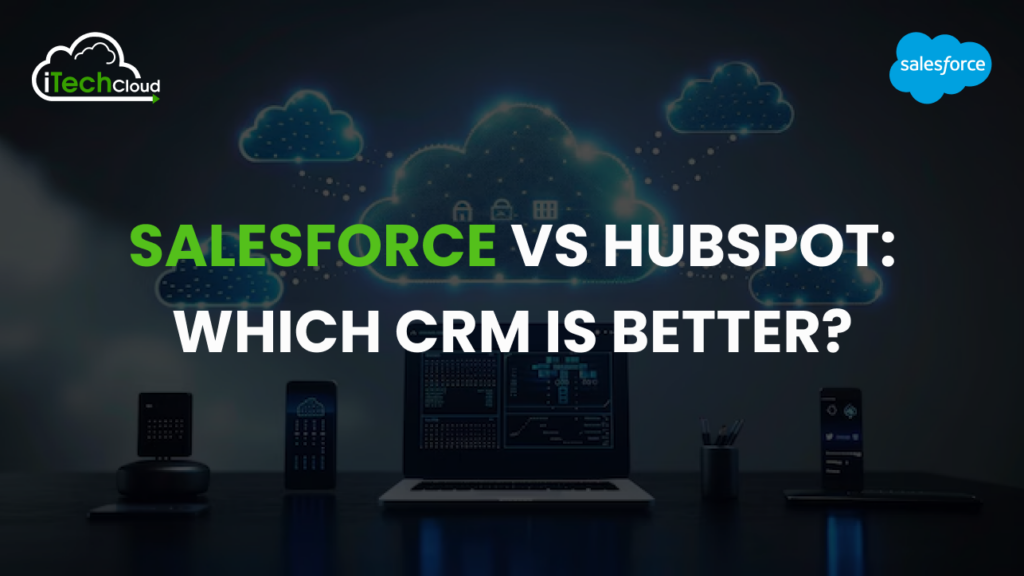Salesforce vs HubSpot: Which CRM is Better?

Customer Relationship Management (CRM) software plays a crucial role in business growth by helping companies manage customer interactions, sales processes, and marketing efforts. Two of the most popular CRM platforms in the market today are Salesforce and HubSpot. Both platforms offer powerful tools for businesses, but they cater to different needs and budgets.
In this detailed comparison, we will analyze Salesforce and HubSpot based on features, pricing, usability, integrations, scalability, customer support, and overall value to help you determine which CRM is better suited for your business needs.
Table of Contents
1. Overview of Salesforce and HubSpot
Salesforce
Salesforce is a cloud-based CRM platform known for its extensive customization, scalability, and enterprise-level capabilities. It provides a robust suite of tools for sales, marketing, customer service, and analytics, making it an excellent choice for large businesses and enterprises.
HubSpot
HubSpot is a user-friendly CRM with a strong emphasis on inbound marketing, automation, and customer relationship management. It is particularly appealing to small and mid-sized businesses (SMBs) looking for a simple, all-in-one solution without complex configurations.
2. Features Comparison
Sales and Marketing Tools
- Salesforce: Offers advanced sales automation, AI-powered insights (Einstein AI), pipeline management, forecasting, and detailed reporting. It integrates deeply with other Salesforce products like Sales Cloud and Marketing Cloud.
- HubSpot: Provides intuitive sales tools, automated workflows, email tracking, and pipeline management. It shines in inbound marketing with features like content creation, SEO tools, and social media management.
Customization and Flexibility
- Salesforce: Extremely customizable with custom objects, fields, dashboards, and workflows. Businesses can develop tailor-made solutions using Apex code and Lightning components.
- HubSpot: Limited customization compared to Salesforce. Offers drag-and-drop options but lacks deep-level customization for large enterprises.
User Experience and Ease of Use
- Salesforce: Powerful but has a steeper learning curve. Requires training to maximize its full potential.
- HubSpot: Designed for ease of use with an intuitive UI, making it easier for teams to get started quickly without extensive training.
Automation and AI
- Salesforce: Einstein AI provides predictive analytics, automated insights, and intelligent recommendations.
- HubSpot: Offers workflow automation, but its AI capabilities are not as advanced as Salesforce’s.
Reporting and Analytics
- Salesforce: Advanced reporting with customizable dashboards and AI-driven insights.
- HubSpot: Offers pre-built reports but has limited deep analytics compared to Salesforce.
3. Pricing Comparison
Salesforce Pricing
Salesforce operates on a tiered pricing model with various plans based on the business’s needs:
- Essentials: $25/user/month
- Professional: $75/user/month
- Enterprise: $150/user/month
- Unlimited: $300/user/month
Additional costs apply for add-ons, integrations, and customizations.
HubSpot Pricing
HubSpot offers a free version with basic CRM functionalities and paid plans for advanced features:
- Starter: $20/month
- Professional: $890/month
- Enterprise: $3,600/month
HubSpot’s free tier is beneficial for small businesses, but pricing scales quickly as advanced features are needed.
4. Integration Capabilities
Salesforce
- Extensive integrations with thousands of third-party apps via AppExchange.
- Seamless integration with tools like Slack, Tableau, and various ERP systems.
- Requires development effort for deep custom integrations.
HubSpot
- Integrates with over 1,000 apps but is not as extensive as Salesforce.
- Works well with marketing automation tools and popular platforms like Gmail, Outlook, and WordPress.
- Easier to set up and connect with third-party tools compared to Salesforce.
5. Scalability and Business Size Suitability
- Salesforce: Ideal for growing businesses, mid-sized companies, and enterprises that require high scalability and customization.
- HubSpot: Best for startups, small businesses, and mid-sized businesses looking for an easy-to-use, cost-effective solution.
6. Customer Support and Community
- Salesforce: Provides 24/7 support (at an additional cost), a vast community, training resources, and a dedicated Trailhead learning platform.
- HubSpot: Offers free customer support for all users, making it accessible, especially for small businesses.
7. Which CRM Should You Choose?
Choose Salesforce if:
✔ You need advanced customization and deep automation. ✔ You are a mid-to-large enterprise looking for a scalable solution. ✔ You require AI-driven analytics and in-depth reporting. ✔ You are willing to invest in a highly configurable and feature-rich CRM.
Choose HubSpot if:
✔ You are a small-to-mid-sized business looking for an easy-to-use CRM. ✔ You want a free or budget-friendly solution for basic CRM functions. ✔ You prioritize inbound marketing tools and simple automation. ✔ You need a quick-to-deploy, user-friendly platform.
Conclusion: Salesforce vs HubSpot
Both Salesforce and HubSpot are excellent CRMs, but they cater to different business needs. Salesforce is best suited for companies that require high customization, scalability, and powerful analytics, while HubSpot is ideal for businesses looking for an affordable, easy-to-use CRM with strong marketing automation.

